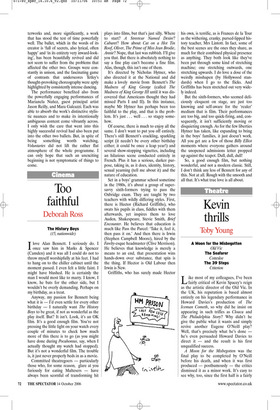Too faithful
Deborah Ross
The History Boys (15, nationwide) Ilove Alan Bennett. I seriously do. I once saw him in Marks & Spencer (Camden) and it was all I could do not to throw myself worshipfully at his feet. I had to hang on to the chiller cabinet until the moment passed. I even felt a little faint. I might have blushed. He is certainly the man I would most like to marry. I know, I know, he bats for the other side, but I wouldn’t be overly demanding. Perhaps on my birthday, as a treat.
Anyway, my passion for Bennett being what it is — I’d even settle for every other birthday — I naturally want The History Boys to be great, if not as wonderful as the play itself. But? It isn’t. Look, it’s an OK film. It’s a good enough film. You’re not pressing the little light on your watch every couple of minutes to check how much more of this there is to go (as you might have done during Pocahontas, say, when I actually thought my watch had stopped). But it’s not a wonderful film. The trouble is, it just never properly beds in as a movie.
Committed theatregoers — particularly those who, for some reason, glare at you furiously for eating Maltesers — have always been scornful of transforming hit plays into films, but that’s just silly. Where to start? A Streetcar Named Desire? Cabaret? How about Cat on a Hot Tin Roof, Oliver, The Prime of Miss Jean Brodie, Annie? Nope, that last was rubbish. I’ll give you that. But there is absolutely nothing to say a fine play can’t become a fine film. Alas, though, this isn’t one of them.
It’s directed by Nicholas Hytner, who also directed it at the National and did make a lovely movie from Bennett’s The Madness of King George (called The Madness of King George III until it was discovered that Americans thought they had missed Parts I and II). In this instance, maybe Mr Hytner has perhaps been too faithful to the play, and that is the problem. It’s just ... well ... so stagey somehow.
Of course, there is much to enjoy all the same. I don’t want to put you off entirely. There’s still Bennett’s crackling, sparkling script (it needn’t be every other birthday either; it could be once a leap year!) and several show-stopping vignettes, including an hilarious scene conducted entirely in French. Plus it has a serious, darker purpose, taking in, as it does, identity, history, sexual yearning (tell me about it) and the nature of education.
Set in a boys’ grammar school sometime in the 1980s, it’s about a group of supersavvy sixth-formers trying to pass the Oxbridge exam. They are taught by two teachers with wildly differing styles. First, there is Hector (Richard Griffiths), who swats his pupils in class, fiddles with them afterwards, yet inspires them to love Auden, Shakespeare, Stevie Smith, Brief Encounter. He believes that education is much like Pass the Parcel: ‘Take it, feel it, then pass it on.’ And then there is Irwin (Stephen Campbell Moore), hired by the Fawlty-esque headmaster (Clive Merrison). He believes that knowledge is merely a means to an end, that presentation wins hands-down over substance, that spin is the thing. If Hector is Old Labour then Irwin is New.
Griffiths, who has surely made Hector his own, is terrific, as is Frances de la Tour as the withering, cranky, pursed-lipped history teacher, Mrs Lintott. In fact, some of the best scenes are the ones they share, as much for their combined physical presence as anything. They both look like they’ve been put through some kind of stretching machine; one stretching outwards, one stretching upwards. I do love a dose of the weirdly misshapen (by Hollywood standards) when I go to the flicks. And Griffiths has been stretched out very widely indeed.
But the sixth-formers, who seemed deliciously eloquent on stage, are just too knowing and self-aware for the ‘realer’ medium that is film. Their performances are too big, and too quick-firing, and, consequently, it isn’t sufficiently moving or disquieting enough. As for the few liberties Hytner has taken, like expanding to bring in the boys’ families, it just doesn’t work. All you get are a few of those Billy Elliot moments where everyone gathers around the unopened admissions letter propped up against the teapot. Dull, dull, dull!
So, a good enough film, but nothing wonderful, and not a modern classic. Still, I don’t think any less of Bennett for any of this. Not at all. Rough with the smooth and all that. It’s what true love is all about.


































































































 Previous page
Previous page